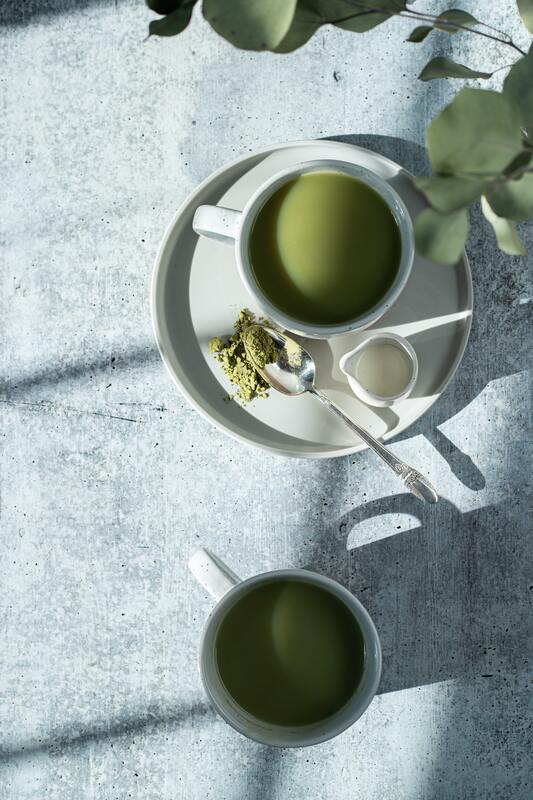Why choose matcha over coffee?
By Nhaya Vaidya
December 7, 2020
Image Credit: Sarah Gualtieri for Unsplash
Not all college students choose coffee as their source of caffeine; some prefer matcha.
Matcha is a powder that is made up of ground green tea leaves that can be used to make drinks or can be used in food. Although matcha and green tea are products of the same leaves, green tea is made by steeping the leaves, whereas matcha powder is made from the leaf itself.
Jocelyn Chen, a junior cell biology and molecular genetics major, prefers matcha over coffee.
“Supposedly [matcha] has health benefits, but I like the flavor,” Chen said. “Coffee has a sour bitter flavor, matcha [is a] little less bitter, and has the green tea taste.”
Chen doesn’t normally drink coffee unless it is very sweet. She adds a lot of cream and sugar to coffee to make it taste better, but it doesn't make her feel good. She feels like coffee has more caffeine, so she drinks coffee for the caffeine and matcha for the flavor.
Sherry Ding, a junior applied math major, likes matcha because she is sensitive to the caffeine in coffee. If she drinks too much coffee she cannot sleep well.
“I prefer sweeter things [and] matcha is more sweet [than coffee],” Ding said.
Like Chen, Ding also drinks coffee for the caffeine content but matcha for the flavor. She typically drinks matcha in the morning. Matcha can be enjoyed as both a cold and a hot drink, but Ding prefers to drink her matcha hot.
The amount of caffeine in a cup of coffee depends on how the coffee is brewed according to Rachel Shifflet, a registered dietitian from Courage to Nourish in College Park. One cup of coffee can have anywhere from 100-200 grams of caffeine, while one cup of matcha has about 80 grams, according to Shifflet.
Coffee can make people feel jittery, nauseous or anxious. However, matcha has a compound called L-Theanine, an amino acid that prevents a caffeine spike, according to Shifflet. Matcha also has vitamins A, C and antioxidants that can help boost metabolism.
“People prefer matcha to coffee because of sustained energy,” Shifflet said.
When switching from drinking coffee to drinking matcha you may feel more lethargic and get more headaches because of the possible caffeine withdrawal, according to Shifflet. However, these symptoms caused by caffeine withdrawal will eventually pass.
Though matcha has many benefits, coffee is much easier to find for a lower price.. High grade matcha powders are more expensive and can cost upwards of $100.
If people are experiencing negative effects from coffee, it may be better to make the switch to matcha since it has less caffeine.
Matcha is a powder that is made up of ground green tea leaves that can be used to make drinks or can be used in food. Although matcha and green tea are products of the same leaves, green tea is made by steeping the leaves, whereas matcha powder is made from the leaf itself.
Jocelyn Chen, a junior cell biology and molecular genetics major, prefers matcha over coffee.
“Supposedly [matcha] has health benefits, but I like the flavor,” Chen said. “Coffee has a sour bitter flavor, matcha [is a] little less bitter, and has the green tea taste.”
Chen doesn’t normally drink coffee unless it is very sweet. She adds a lot of cream and sugar to coffee to make it taste better, but it doesn't make her feel good. She feels like coffee has more caffeine, so she drinks coffee for the caffeine and matcha for the flavor.
Sherry Ding, a junior applied math major, likes matcha because she is sensitive to the caffeine in coffee. If she drinks too much coffee she cannot sleep well.
“I prefer sweeter things [and] matcha is more sweet [than coffee],” Ding said.
Like Chen, Ding also drinks coffee for the caffeine content but matcha for the flavor. She typically drinks matcha in the morning. Matcha can be enjoyed as both a cold and a hot drink, but Ding prefers to drink her matcha hot.
The amount of caffeine in a cup of coffee depends on how the coffee is brewed according to Rachel Shifflet, a registered dietitian from Courage to Nourish in College Park. One cup of coffee can have anywhere from 100-200 grams of caffeine, while one cup of matcha has about 80 grams, according to Shifflet.
Coffee can make people feel jittery, nauseous or anxious. However, matcha has a compound called L-Theanine, an amino acid that prevents a caffeine spike, according to Shifflet. Matcha also has vitamins A, C and antioxidants that can help boost metabolism.
“People prefer matcha to coffee because of sustained energy,” Shifflet said.
When switching from drinking coffee to drinking matcha you may feel more lethargic and get more headaches because of the possible caffeine withdrawal, according to Shifflet. However, these symptoms caused by caffeine withdrawal will eventually pass.
Though matcha has many benefits, coffee is much easier to find for a lower price.. High grade matcha powders are more expensive and can cost upwards of $100.
If people are experiencing negative effects from coffee, it may be better to make the switch to matcha since it has less caffeine.
|
|
Learn more |
© COPYRIGHT 2020. ALL RIGHTS RESERVED.
|
